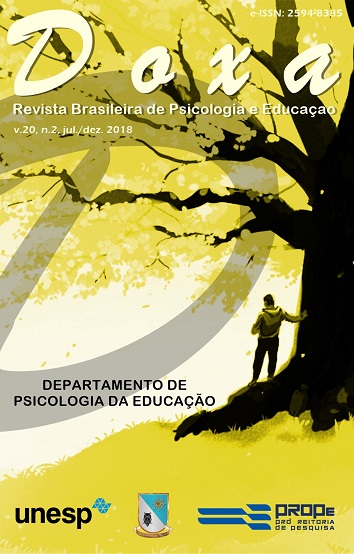Validação da versão adaptada do parent perception inventory - PPI em crianças brasileiras de 7 a 12 anos
DOI:
https://doi.org/10.30715/doxa.v20i2.11602Palavras-chave:
Criança, Práticas parentais, Instrumentos psicológicos, Análise fatorial confirmatória.Resumo
A temática da criação dos filhos vem sendo muito pesquisada e diversos trabalhos têm dedicado atenção especial aos estilos e práticas parentais. Desde a década de 1930, psicólogos pesquisadores e clínicos têm se preocupado com questões como: Qual a melhor forma de educar os filhos e quais são as conseqüências que podem ser provocadas no desenvolvimento das crianças educadas por diferentes modelos de pais. Considerando a relevância da relação entre pais e filhos no processo de desenvolvimento, este estudo objetivou-se validar, através da análise fatorial confirmatória, uma versão adaptada para crianças brasileiras do Parent Perception Inventory – PPI, para mensurar o comportamento dos pais com relação às práticas educativas na percepção dos filhos. Participaram do estudo 600 crianças de 7 a 12 anos, de ambos os sexos, de escolas públicas e privadas da cidade de Ribeirão Preto-SP que responderam duas versões do PPI, uma para o pai e outra para a mãe, cada uma com 18 itens que avaliam nove classes de comportamento positivo e nove classes de comportamento negativo. Por meio do método de Máxima Verossimilhança pôde-se confirmar o modelo de duas dimensões, fatores positivos e negativos, referentes às práticas adotadas, distribuídos respectivamente nos itens impares e pares da escala para as duas versões. Tais componentes apresentaram Alfa de Cronbach entre 0.67 e 0.81 e se correlacionaram positivamente com os domínios da escala utilizada para testar a validade convergente. Conclui-se que o instrumento é valido e pode ser usado em estudos para identificar o comportamento parental do ponto de vista da criança.
Downloads
Referências
ALVARENGA, P.; PICCININI, C. Práticas educativas maternas e problemas de comportamento em pré-escolares. Psicologia: Reflexão e Crítica, Porto Alegre, v. 14, n. 3, p. 449-460, 2001.
BAURIND, D. Effects of authoritative control of child behavior. Child Development, v. 37, n. 4, p. 887-907, 1966.
BENETI, S. P. C.; BALBINOTI, M. A. A. Elaboração e estudo de propriedades psicométricas do Inventário de Práticas Parentais, Psico-USF, v. 8, n. 2, p. 103-113, jul./dez. 2003
BERNS, L. A. de.; WAGNER, A. Reflexões sobre a construção da parentalidade e o uso de estratégias educativas em famílias de baixo nível socioeconômico. Psicologia em Estudo, Maringá, v. 11, n. 1, abr. 2006.
CARVALHO, M. C. N.; GOMIDE, P. I. C. Práticas educativas parentais em famílias de adolescentes em conflito com a lei. Estudos de Psicologia, Campinas, v. 22, n. 3, p. 263-274, 2005
CECCONELLO A. M.; KOLLER S. H. Competência social e empatia: um estudo sobre resiliência com crianças em situação de pobreza. Estudos de Psicologia. 2013
COSTA, F. T. da.; TEIXEIRA, M. A. P.; GOMES, W. B. Responsividade e exigência: duas escalas para avaliar estilos parentais. Psicologia Reflexão e Crítica, v. 13, n. 3, p. 465-473, 2000.
DANCEY, C.; REIDY, J. Estatística Sem Matemática para Psicologia: usando SPSS para Windows. Artmed, Porto Alegre, 2006.
DARLING, N.; STEINBERG, L. Parenting style as context: an integrative model. Psychological Bulletin, n. 113, 487-496, 1993.
GOMIDE, P. I. C. IEP Inventário de estilos parentais: modelo teórico: manual de aplicação, apuração e interpretação. Petrópolis, Rio de Janeiro: Vozes, 2006.
HAZZARD, A.; CHRISTENSEN, A.; MARGOLIN, G. Children’s perceptions of parental behavior. Journal of Abnormal Child Psychology, v. 11. p. 49-60, 1983.
HOFFMAN, M. L. Moral internalization, parental Power and the nature of parent-child interation. Developmental Psychology, v. 11, n. 2, p. 228-239, 1975.
KOBARG, A. P. R.; VIEIRA, V.; VIEIRA, M. L. Validação da Escala de Lembranças sobre Práticas Parentais (Embu). Avaliação Psicológica, Porto Alegre, v. 9, n. 1, 2010.
MACCOBY, E.; MARTIN, J. Socialization in the context of the family: parentchild interaction. In: HETHERINGTON, E. M. (Org.). Handbook of child psychology, v. 4. Socialization, personality, and social development. 4 ed. New York: Wiley, 1983. p. 1-101.
OLIVEIRA, E. A. et al. Estilos parentais autoritário e democrático-recíproco intergeracionais, conflito conjugal e comportamentos de externalização e internalização. Psicologia Reflexão e Crítica, v. 15, p. 1-11, 2002.
PASQUALI, L.; GOUVEIA, V. V.; SANTOS, W. S.; FONSECA, P. N.; ANDRADE, J. M.; LIMA, T. J. S. Questionário de Percepção dos Pais: evidências de uma medida de estilos parentais. Paidéia, Ribeirão preto, v. 22, n. 52, p. 155-164. DOI: 10.1590/S0103-863X2012000200002. 2012.
PICCININI, C. A. et al. Práticas educativas de pais e mães de crianças aos 18 meses de idade. Psicologia: Teoria e Pesquisa, v. 23, n. 4, p. 369-378, 2007
SANTOS, C. Estatística Descritiva: mnual de auto-aprendizagem. 2 Ed. Lisboa: Edições Silabo, 2007.
WEBER, L. N. D. et al. Continuidade dos estilos parentais através das gerações-transmissão intergeracional de estilos parentais. Paidéia, Ribeirão Preto, v. 16, n. 35, p. 407-414, 2006.










